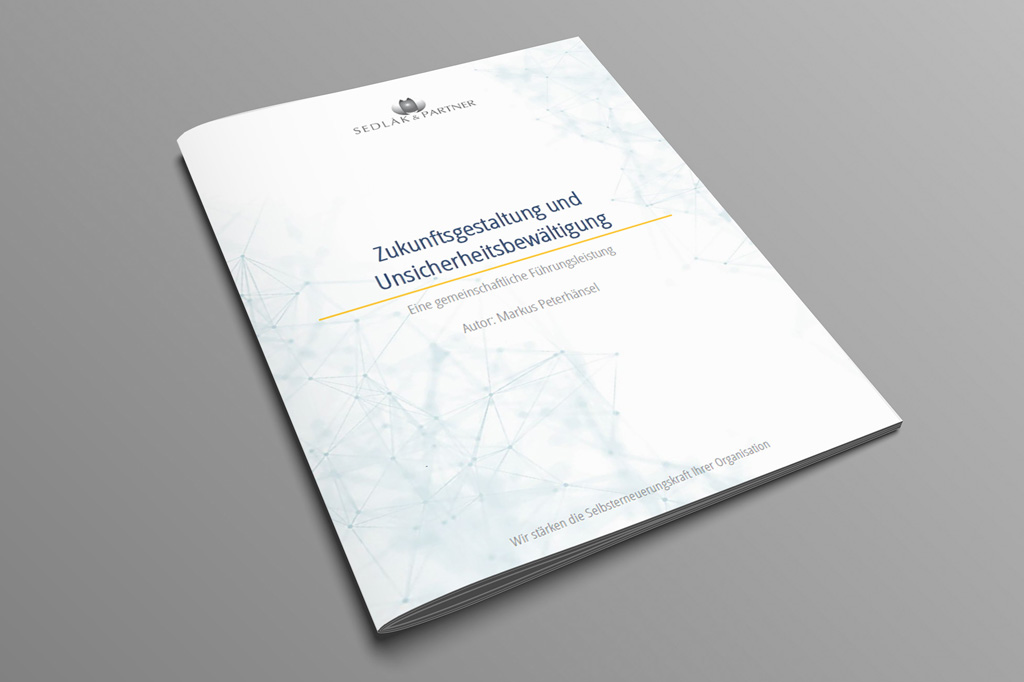The organizational environment is characterized by uncertain and dynamic conditions. A viable strategy makes it possible that the necessary focus is ensured allowing to make far-reaching decisions despite uncertainty - and thus to maintain the organizational ability to act. Mobilizing existing system intelligence opens up new options in strategy development.

The organizational environment is characterized by uncertain and dynamic conditions. A viable strategy makes it possible that the necessary focus is ensured allowing to make far-reaching decisions despite uncertainty - and thus to maintain the organizational ability to act. Mobilizing existing system intelligence opens up new options in strategy development.
Uncertainty: the basis of entrepreneurial activity
The future is and remains uncertain. There is nothing wrong with this per se, it rather offers the opportunity to gain an early advantage over all competitors by cleverly anticipating future developments. Successful companies are those that discover needs and problems in the market or in society for which there are currently no effective solutions and find smart answers to them. Companies are therefore called upon to shape their own future as part of the strategy development process and to create a vision of the future that is worth working towards.
A sustainable strategy creates a difference between the present and the future. If a difference between today and tomorrow can be established successfully, it mobilizes the necessary energy for foresighted self-renewal in the organization. In addition, strategic determinations provide the necessary orientation for day-to-day operations. Management and employees know which goals are being pursued. This brings certainty to daily decisions.
Strategy development as a collaborative management effort
Systemic organizational consulting understands strategy development as a joint effort of the management system, which cannot be delegated to external parties. Strategy work should not be carried out as an elaborate, separate process, but should be understood as an everyday management task.
The strategy is based on hypotheses jointly agreed upon in the management system. For example with regard to emerging developments or the expectations and requirements of the markets and stakeholders. However, these hypotheses are not set in stone – they need to be regularly tested for validity.
The strategy review ensures a thorough examination of the question which specifications are consciously maintained, despite indications of the need for change, and which specifications should be changed in order to secure the future viability of the company.
In this way, the course taken is regularly analyzed against the backdrop of potentially changing conditions and, if necessary, adjusted. This enables the company to take account of dynamic developments in the business environment and safeguard its success in the long term.
A viable strategy provides answers to the following key questions:
- Who do we want to be in the future?
- In which markets do we want to operate?
- Which customer groups do we want to focus on?
- What services do we want to offer our customers and what are the benefits?
- How do we want to differentiate ourselves from the competition?
How does systemic consulting contribute to strategy development?
The task of external consulting is to develop and accompany a suitable architecture within the framework of a strategy development and strategy review process, taking into account the individual framework conditions and the organizational DNA. The goal is to use the existing system intelligence to develop a sustainable vision of the future. In this context, it is important that external consulting ensures that the respective strategy team is charged with new impulses in such a way that variation is made possible within the strategy process. This often means that massive irritations are necessary in order to question entrenched lines of thought and to identify existing blind spots.
When it comes to making strategic decisions as part of the selection process, external consulting must support decision-makers in opening up to new ideas and ensuring that they do not just continue to play the old tune. We see controversies that arise during the strategy process as a great opportunity to create something new. And we see it as our responsibility to accompany the process in such a way that the decision-making ability of the strategy team is ensured.
Organizations deal with themselves when left to their own devices, and they usually do not perceive their own blind spots: Every organization has observation and evaluation patterns that structure its perception and at the same time have a stabilizing effect. What has worked well in the past is repeated.
A strategy process, however, should not refer to the past, but should be oriented in its entirety toward the future perspective that the company has created for itself. This requires an intensive examination of the relevant environments, a detachment from the previous identity and an orientation toward an attractive identity design.
By interlinking internal and external organizational knowledge, experiences and assessments, new perspectives and insights emerge that are only possible through this constellation. Systemic consulting ensures that the existing system intelligence is mobilized and included both in the development of options (variation) and in the decision (selection). In this way, solutions that do not yet exist are created.

ORGANIZATIONS DEAL WITH THEMSELVES IF THEY ARE LEFT TO THEIR OWN DEVICES. IN THE STRATEGY PROCESS, IT IS THEREFORE IMPORTANT TO ENSURE THAT THE ORGANIZATION DEALS WITH ITS RELEVANT ENVIRONMENTS AND OPENS UP A DIFFERENCE BETWEEN THE PRESENT AND THE FUTURE. IN THIS WAY, IT CAN REMAIN CAPABLE OF RESPONDING TO CONSTANT CHANGES IN THE ENVIRONMENT AND EVER NEW DEMANDS FROM CUSTOMERS AND MARKETS.
– Jan-Niclas Bockard
Senior Project Manager | Consulting field strategy
Using system intelligence in strategy development
System intelligence is a decisive success factor in strategy development as well as in subsequent strategy reviews. The knowledge required to make well-founded hypotheses about emerging developments is usually already located in the organization and the organizational environment. This includes, for example, customers, suppliers, universities, expert groups, or other stakeholders.
In the context of strategy work and foresighted self-renewal, it is important to interlink relevant internal and external organizational knowledge, experience, and assessments and to make them available for the decision-making process. This can lead to new insights and perspectives that reduce existing blind spots and open up completely new options.
Topics of systemic strategy consulting
Develop a strategy with our competent consultants that enables your organization to act agilely and with foresight in the market and to shape the future with confidence:
Background information on systemic strategy consulting

Background information: Strategy development
and review
Download free background information on our consulting services for strategy development and strategy review.
In dynamic and uncertain market situations, it is not the current response behavior of an organization that establishes competitive advantage, but the long-term design of response capabilities and key resources.
Contact options
If you would like to learn more about us and our consulting approach, we look forward to a personal conversation with you! Simply make an appointment with us.

Online
Make a non-binding inquiry and
specify your expectations
 Frédéric SedlákSenior Consultant | HR Management
Frédéric SedlákSenior Consultant | HR ManagementWe are always at your service+49 4102 69 93 22
Ask for free informationf.sedlak@spconsulting.de









